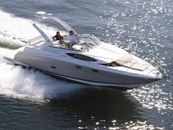Q: What should I do before I bring my pet on board?
A: Get a checkup, make sure vaccinations are up to date, carry a signed vaccination certificate and or health certificate, get a stool test to check for worms, check for heartworm and make sure the dog is on preventative medication. Make sure nails are trimmed and pads are in good shape.
Q: What should I carry in my pet’s First Aid Kit?
A:
- Ears: Panalog Ointment
- For Minor Scrapes: Panalog Ointment
- Eyes: Eye washes or artificial tears. Triple antibiotic ointment without cortisone
- Shampoo: Quality conditioning shampoo and crème rinse. When you can’t give your dog a real bath use waterless shampoo or grooming. Or sprinkle on some baking soda and brush.
- Hotspots: Panalog ointment
- Nails: Bring a nail trimmer
Q: What should I do if my dog gets seasick?
A: Once a dog gets sick it is too late to give pills. Start pills a day or two ahead. Begin with 1/4 of the adult dose of human remedies (Dramamine) and work upwards for individual pets. Pills may cause drowsiness and like with all human medications, double check with a veterinarian.
Q: How do I check for heatstroke and what should I do?
A: Rectal temperature is normally 101 to 101.5; temperatures of 105 to 106 can cause irreversible brain and nerve tissue damage. If this happens immediately immerse the pet in cold water and call your vet.
Q: What else should I do to prepare for boating with my pet?
A: While on the boat:
- Make sure the pet is always wearing a floatation device, preferably one with a handle so you can lift their head above water or help lift them out of the water.
- Make sure dog had identification or has been microchipped
- Put the pet’s bed or bedding in a quiet area.
- Carry a fresh water supply and keep water available at all times and avoid allowing your pet to drink the local water.
- Carry enough food to cover the trip plus a couple extra days. Limit the dog’s intake prior to the cruise. After 4-5 hours give your pet more food.
- Medications: Make sure to carry a supply of any medications that your pet may be on.
- Keep a long handled crab or fish net within grabbing distance on deck to retrieve small pets that fall overboard.
- For cats hang a strip of carpet overboard in case they go overboard. They may be able to grab onto it and climb back up.
- Exercise: Make sure your dog is exercised either by swimming or running around the deck. Bring floatable toys for the dog to play with and also chews.
- When on land never allow your pet to roam off leash, never allow your pet to go visit with a strange dog. Clean up and properly dispose of any feces.
Submitted by BOAT/US Magazine www.boatus.com
See Also:
